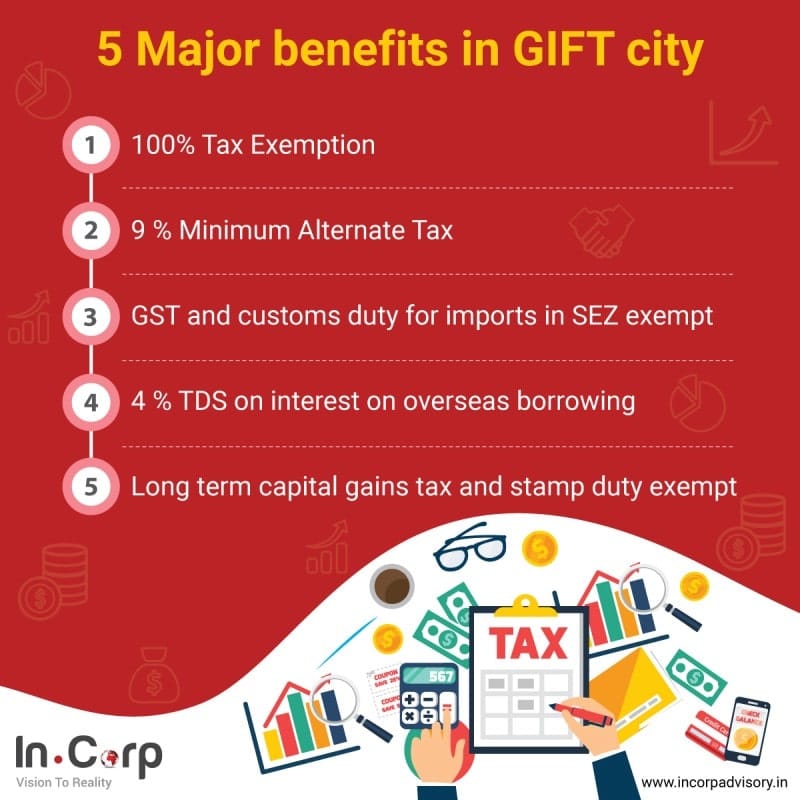Tax Incentives for Startups in Budget 2025-26

Tax Incentives for Startups in Budget 2025-26
Functioning of GIFT City: Understanding Tax benefits, structure, permissible services, and budget highlights
- Authors
- Last Updated
- Tags
- Last Updated
- Authors
- Last Updated
- Tags
Every year the government of India introduces various measures to strengthen the regulatory framework in GIFT City. In the recent Union Budget, specific tax benefits were introduced by the finance minister for units in the International Financial Service Centre (IFSC) to attract foreign investors and encourage offshore funds to relocate to India’s smart city. In this blog, we look at GIFT City’s tax benefits, structure, permissible services, and budget highlights.
What is GIFT City?
The Gujarat International Finance Tec (GIFT) City consists of 2 zones:
| Special economic zone (SEZ) | Domestic tariff area (DTA) |
To make GIFT City a global hub for financial services and the government of India has been working along with various regulators. It is a developed area with state-of-the-art infrastructure, including power, water supply, transport, and housing. It is an ideal environment for you to set up your business.
What is GIFT City SEZ?
- SEZ is an area designated in Gift Cty where you may set up units to carry specific manufacturing and trading activities and provide certain services.
- The formation of a Special Economic Zone (SEZ), is governed by the Special Economic Zone Act, 2005 in India.
- It is considered a foreign territory which means that you need to treat the goods and services going into SEZ as exports and goods and services coming from the SEZ as imports.
- An SEZ aims to boost the economy by exporting certain goods and services.
What is GIFT City IFSC?
International Financial Service Centre (IFSC) is a multi-service SEZ in Gift City. IFSC is India’s first Offshore financial center. Currently, there are more than 125 licensed financial entities in IFSC. The key institutions permitted to set up an IFSC unit are the Banking sector, Insurance sector, and Capital Markets.
Features of IFSC are as follows
- An IFSC is a jurisdiction providing financial services to both residents and non-residents, in foreign currency. It is considered as a person resident outside India for exchange control purposes.
- Such centers deal with flows of finance, financial products, and services across borders.
- It is a global financial platform aimed at providing easy access to the Indian economy, which is amongst the world’s largest and fastest-growing economies.
- In January 2017, Prime Minister of India, Narendra Modi inaugurated India’s first international exchange in IFSC. This exchange includes trading across all asset classes such as equities, currencies, commodities, and fixed-income securities.
- Further, in December 2020 regulations have been made to enable the setting up of India’s first International Bullion Spot Exchange.
- IFSC provides the very competitive cost of operations with various tax benefits, single-window clearance, relief under various company law provisions, international arbitration center with overall facilitation of doing business.
What is the International Financial Services Centres Authority (IFSCA)?
International Financial Services Centres Authority was established in April 2020 under the International Financial Services Centres Authority Act passed by the Indian Parliament. For the first time, the regulatory powers of four financial services regulators in India, namely, Reserve Bank of India (RBI), Securities & Exchange Board of India (SEBI), Insurance Regulatory Development Authority of India (IRDAI), Pension Fund Regulatory Development Authority of India (PFRDAI), have been vested in IFSCA with for regulation of financial institutions, financial services and financial products in the IFSC, making it a unified regulator for the International Financial Services Centre in India. In 2021, International Financial Services Centres Authority (IFSCA) became an associate member of the International Organization of Securities Commissions (IOSCO).
What are the Services Rendered in GIFT City?
Prime Minister Narendra Modi’s vision is to attract foreign business through GIF City. So, there’s an array of services that companies can indulge in. Gift City SEZs are specifically defined areas where you may set up your business unit for specified purposes of manufacturing, trading as well as rendering services.
You can also provide warehousing facility services for specific goods. You can import and export services or carry on import-export activities of certain goods (subject to authorized operations).
Further, as SEZ is a foreign territory, the supply of goods or services by an Export Oriented Unit (“EOU”) or Software Technology Parks of India (“STPI”) unit is regarded as export. Foreign Trade Policy (“FTP”) regards supplies to SEZ as export of goods or services.
Gift City was established to facilitate business in the banking and insurance sector as well as capital markets. The following services are rendered:
- To raise funds for individuals, corporations, and governments.
- Asset management and global portfolio diversification are undertaken by pension funds, insurance companies, and mutual funds.
- Global tax management.
- Corporate treasury management operations.
- Risk management operations such as insurance and reinsurance.
- Merger and acquisition activities among multinational corporations.
On 10th February 2021, IFSCA has introduced a new framework to enable ancillary services. Based on this circular, the following ancillary services are permissible:
| Legal, Compliance and Secretarial; | Auditing, Accounting, Bookkeeping and Taxation Services; |
| Professional & Management Consulting Services; | Administration, Assets Management Support Services and Trusteeship Services; |
| Any other services as approved by IFSCA from time to time. |
If you are a service provider you can also provide services to entities set up in the IFSC.
What are the Tax Benefits in GIFT City?

You can also enjoy the following tax benefits:
- Stamp Duty exemption
- Goods & Service Tax (GST) exemption
- No withholding tax (TDS) on interest payable to a non-resident by an IFSC unit on overseas borrowings
- 4 % withholding tax (excluding surcharge and cess) on interest on overseas borrowings. (Borrowings such as – long-term bond or rupee denominated bond listed on an IFSC stock exchange)
- The government has further granted various tax incentives to AIF (Alternative Investment Funds) setup in Gift City. The AIF’s may invest through the FDI (Foreign Direct Investment) or Foreign Venture Capital Investor (FVCI) route. Earlier AIF’s could only invest through the FPI (Foreign Portfolio Investor) route
- Tax incentives have been provided to non-residents investors investing in such AIF located in IFSC
Key Highlights Regarding GIFT City in Budget
The government aims to make GIFT City a global financial hub. The following reforms were announced in the budget:
- The finance minister Nirmala Sitharaman announced that a world-class fintech hub is under development in Gujarat’s smart city. This development will promote fintech firms and help them expand globally. It will also generate employment opportunities.
- The government has facilitated debt financing of REIT (Real estate Investment Trusts) and InvIT (Infrastructure Investment Trusts) by Foreign portfolio Investment (FPI)
- The budget mentioned special tax incentives for relocating foreign funds in the IFSC and exemption of dividends on REIT and InvIT
- In 2020, the aircraft financing and leasing business as a financial product under IFSCA. The finance minister mentioned that India is the world’s third-largest domestic aviation market. The budget introduced the following tax benefits to promote the aircraft finance and leasing industry in IFSC:
- Capital gains exemption on income arising from aircraft leasing
- Aircraft lease rentals paid to foreign lessors are tax exempt
The announcements mentioned above would help attract global players in the Fund business, aircraft leasing & financing business to set up their base in GIFT IFSC.
Conclusion
IFSC reinforces India’s strategic position as a global business hub for financial services. GIFT City has a lot of economic and fiscal benefits. It has been meticulously planned and structured to lure foreign investors and institutions. The government has introduced various reforms in every budget over the last few years to boost GIFT City. The aim is to be on par with other leading financial centers such as Dubai, Singapore, and London.
Why Choose InCorp?
Our team at InCorp has the expertise to offer comprehensive assistance throughout the entire process of listing companies on international exchanges in GIFT City IFSC. To learn more about our GIFT City services, you can write to us at info@incorpadvisory.in or reach out to us at (+91) 77380 66622.
Authored by:
InCorp Advisory | GIFT City
Frequently Asked Questions About GIFT City
The Budget offers incentives like reduced corporate tax rates, enhanced depreciation benefits, tax holidays for startups, and incentives for green and digital initiatives.
Businesses benefit from lower tax liabilities, improved cash flow, and increased investment capacity, boosting overall competitiveness.
Yes, startups enjoy extended tax holiday periods, relaxed compliance norms, and deductions on eligible investments, supporting growth and innovation.
Foreign investors gain from clarified taxation rules, reduced MAT rates, and incentives for foreign capital inflows, making India a more attractive investment destination.
MAT rates have been reduced and the applicability widened, ensuring fair taxation while encouraging reinvestment and compliance.
Share
Share








































































